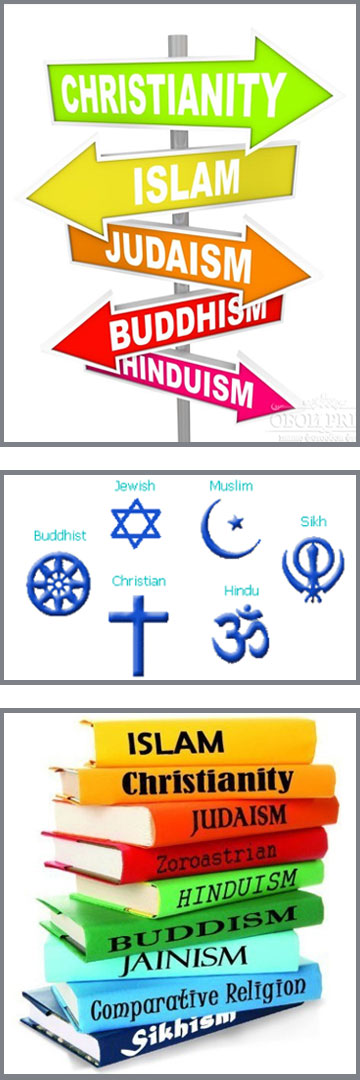On specific instructions a Will can be drafted according to any faith or religion a client has.
This company makes only one type of religious Will which is an Islamic Will.
A Will can be made for you that complies with the laws of England & Wales and is in accordance with the Islamic Shari’a law. This enables the will to be accepted by the English courts.
A Muslim is obliged to make a will.
There are many advantageous reasons for making a will (see section ‘Everybody Needs a Will’ in the ‘Will Writing’ section). For example any children under 18 at the time of death can be taken into care by the Local Authority if you do not leave a Will.
By Law a person without making a will valid for the country they live in cannot distribute their estate in the way that they would wish. Not making a will means a person is regarded by law as dying ‘intestate’ and therefore subject to the Rules of Intestacy (estate being divided in specific shares according to English law) (see ‘Rules of Intestacy’ page)The rules of intestacy are different to Shari’a law. In English law if there are no relatives the whole estate will become the property of the Crown (government).
The Islamic Will includes bequests, legacies, instructions, admonishments, and assignments of rights.
An “estate” is the collective name for everything you own and consists of the following:
- All properties, goods and investments that are in your name.
- Half of the specified portion of the goods and investments in which you are a co-owner.
English Law and Shari’a Law are Different
There are significant and important differences between English and Shari’a law which have to be appreciated. These contradictions lead to different inheritance outcomes when each is applied to a similar situation. The English law will always take precedence over Shari’a law in this jurisdiction.
Some Differences:
- If only a religious marriage has taken place in the United Kingdom and a Will is not made the English law treats the spouse as an ‘umarried partner’ thus making them have no right to any of the estate of the deceased.
- If a couple married by English law divorce only under Islamic law the spouse is still entitled to a share of the estate if a Will was not made. However under the Shari’a law the divorced spouse is not entitled to a fixed share.
There is a need in the United Kingdom for Muslims to have English and Islamic marriages/divorces simultaneously as it affects not only their rights when they are alive but also when a partner becomes deceased.
Criteria for an Islamic Will
- Written or oral with 2 witnesses (written will is better as it can be verified and is more certain).
- Two thirds must be distributed among surviving relatives in fixed shares. You may state that certain items go to specific people provided the value of those items does not exceed the share to which they are entitled unless the other inheritors accept a reduction in their share.
- One third of your wealth can be left to whom you wish (including non-Muslims and charities) after debts and expenses (for example funeral expenses) have been paid. If more than that is left the amount can be distributed with the agreement of those who are entitled to fixed shares. None of the one third must be left to any relative who will already be receiving a fixed share in the two thirds.
- If no part of the one third is bequeathed then then that share will be distributed among surviving relatives according to Shari’a law.
Islamic Law Related Aspects:
- Spouse is entitled to a fixed share if married under Islamic law.
- The reason females get a smaller share than males in Islamic law is that a male relative (husband/father/brother/uncle) is always obliged to look after the financial needs and welfare of the female.
- If an Islamic Marriage and divorce have taken place the former spouse is still entitled to a fixed share if the death of the husband is within the prescribed mourning period. If the mourning period has passed she will not be entitled to a share. The option of leaving something out of the one third is still applicable.
- Children can inherit once they have reached puberty. If puberty is not reached Guardian is appointed to look after property on their behalf from surviving relatives or close friends (similar to the concept of Trustee in English law).
- If the wife is pregnant at the time of death the estate is not distributed until the child is born. This new child receives a fixed share.
- If there are no surviving relatives you can leave one third of your wealth to anyone you want. The rest of your wealth i.e. two thirds then goes to the community where it is distributed by the community leader as they deem fit. Your community usually has a registered charity and it is advisable in these circumstances to leave a gift from the residue of the estate (residue is what is lift after all debts, expenses and specific gifts are paid) to that charitable trust. If the charitable trust does not exist or cannot be identified a clause at the end of the Will allowing the Executor to hold the residue on trust and to distribute it among the community at their discretion will ensure the whole estate is distributed.
- A residuary gift is advised in all circumstances to avoid the government claiming any part of the estate that was not accounted for in the Will.
- The Islamic Ideology a person follows (Madhhab) should be stated in the Will allowing for certainty as to the way in which wealth is distributed.
The Heirs
The different types of relationships from which heirs come from in the United Kingdom consist of Kinship, marriage and the community (Bayt al-Mal).
Male relatives include half-brothers, sons of brothers, full paternal uncles, paternal uncles of the father sons of paternal uncles but not maternal uncles
The female relatives are within the heirs category and include wife, grandmother, sister, half-sisters but does not include full maternal or paternal aunties.
The Shares
Specific calculations will be provided dependant on the permutation of family provided in instructions
Only some relatives are entitled to fixed shares.
A wife on the death of her husband who has no living children or grandchildren will receive a quarter of his estate. If he had children she will get only one eighth of the estate.
A husband on the death of his wife is she has no living children or grandchildren gets one half of her estate. If she has left children his share will then be a quarter.
A mother inherits a third of the son’s estate if he does not have any living children or grandchildren, or two or more siblings unless:
- He is survived by a wife and both of his parents in which case the wife receives a quarter, the mother a third of what is left and the rest to the father.
- If the wife is survived by her husband and both of her parents the husband receives a half, the mother a third of what is left and the rest to the father. The mother would get a sixth if there are children, grandchildren or two or more siblings.
A father will receive from his child if that was his only child who had no children the entire estate. If there were children or grandchildren the fathers share is reduced to a sixth.
There will be a number of combinations of surviving relatives as families are large. The Shari’a law provides for a certainty of shares in respect of all combinations.
Examples of Shares
Spouse & Children (2 generations)
- Wife, Daughter & Son wife (1/8), male child gets twice the share of female child.
- Husband, Daughter & Son husband (1/4), male child gets twice the share of female child.
- Wife, Daughter & Sons wife (1/8), male child gets twice the share of female child
- Husband, Daughter & Sons husband (1/4), male child gets twice the share of female child.
- Wife, Daughters & Son wife (1/8), male child gets twice the share of female child
- Husband, Daughters & Son husband (1/4), male child gets twice the share of female child.
Parent, Spouse & Children (3 generations)
- Parent, Wife, Daughter & Son father or mother 1/6, wife 1/8, male child gets twice the share of female child.
- Parent, Husband, Daughter & Son father or mother 1/6, husband ¼, male child gets twice the share of female child.
- Parent, Wife, Daughter & Sons father or mother 1/6, wife 1/8, male child gets twice the share of female child.
- Parent, Husband, Daughter & Sons father or mother 1/6, husband ¼, male child gets twice the share of female child.
- Parent, Wife, Daughters & Son father or mother 1/6, wife 1/8, male child gets twice the share of female child.


